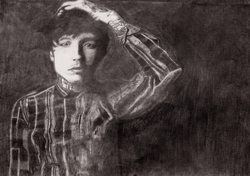
Ceramics 1
Ceramics 1
Unity-Principle of Design
Unity-Principle of Design
Unity-Principle of Design
Unity-Principle of Design
Unity-Principle of Design
Unity-Principle of Design

Lines are everywhere. You can see lines in the grain of a piece of wood or in the cracks on a sidewalk.
In art, Line is an element of art that is the path of a moving point through space.
Lines are used to:
-
Create boundaries between shapes
-
Create boundaries between colors, textures or values
-
Lead the eye from one space to another
-
Create textures
-
Suggest emotional qualities
Lines are everywhere. You can see lines in the grain of a piece of wood or in the cracks on a sidewalk.
In art, Line is an element of art that is the path of a moving point through space.
Lines are used to:
-
Create boundaries between shapes
-
Create boundaries between colors, textures or values
-
Lead the eye from one space to another
-
Create textures
-
Suggest emotional qualities
Classwork & assignments
Grid drawing is a very old technique of transferring images (from sketches to a full size canvas or fresco, etc...)
Always make sure that the number of squares on the original picture and your working area are exactly the same (even if the size of the squares are bigger on the paper). This is because no matter how many times bigger (or smaller) you make the drawing, the proportions and dimensions can only stay the same if the number of boxes (squares) matches exactly.
Make sure you follow all steps below.
2.3.2 The Van Eycks and Rogier van der Weyden

Grid drawing is a very old technique of transferring images (from sketches to a full size canvas or fresco, etc...)
Always make sure that the number of squares on the original picture and your working area are exactly the same (even if the size of the squares are bigger on the paper). This is because no matter how many times bigger (or smaller) you make the drawing, the proportions and dimensions can only stay the same if the number of boxes (squares) matches exactly.
Make sure you follow all steps below.
Examples:
 |  |  |
|---|---|---|
 |  |  |
 |  |  |
 |  |  |
 |  |  |
 |  |  |
 |  |  |
 |
Directions: You will be creating a high quality and super realistic drawing using the Grid Method!
Step1. Find and print a 4” X 5” black and white image with value changes, gradation and contrast. You may need to trim down the image to these proportions.

Step 2. Next measure the image and “grid” it using 1/2 " squares. Put the letters and numbers on the sides.

Step 3. Using your pencil lightly draw a larger grid on your 8"x10"” drawing paper with 1.5" squares. (Hint: This is exactly 3 times the size of the image). Lightly draw the letters and numbers on the sides. Remember you will have to erase the grid lines later so don't go too dark!
To create the grid you will place marks every 1.5 inches on your paper going up to 15 inches one way and 12 inches the other direction. Your original image was 4 x 5 inches with 1/2 inch squares. You are making the drawing 3 times bigger than the photo so your squares will be 1.5 inches (3 times 1/2 inch). You will have the same number of squares in both the photo and the drawing. The squares will just be 3 times larger.



Finally complete the grid by adding all of the lines. Again draw the lines extra extra light so you can easily erase them later.


Start with big shapes first.
Notice where the main shapes cross the grid lines.

Label the numbers and letters lightly inside the paper so you know what square to work on
Step 4.
There are many shapes inside each square. Some of them are well defined, some are blurry. You'll need to copy them all.
Try not to think of what you are drawing - just copy the shapes accurately. Think that you are copying an abstract design.
It helps to cover the area around the square that you are copying at the time. Use sticky notes or just a few pieces of paper - that will help you to concentrate on just one square, without being distracted by others.
Start with square 1.
IMPORTANT: as you copying the shapes - DO NOT shade anything!!! Just outline the shapes!!!!
Mark that on your drawing paper.
Think: "...this line crosses the grid about 1/3 of the square, or it crosses it right in the middle..."

Notice the outlines of the main shapes.

Copy these outlines.

Now - the secondary shapes. If they are not well defined - try your best to draw their outlines.
Work with one square at a time.
Copy everything you see. Forget the big picture. Just copy all the shapes that you see (even the blurred ones).
Next - connect these marks. Make sure the shapes match. Do not shade. Use only light fine pencil lines.
Add as many details as possible. No rush!
Once you are done with one square - move to the next one. Keep drawing.
When finished - erase the grid, especially in the areas of light values.


Step 6.
Take a careful look at the photograph. Find the most important / detailed areas. These are the areas you want to focus on.
Start shading with the darkest values first. Carefully shade all values and value transitions. Use small strokes.
The drawing should have as many value variations as the photograph. Have the strokes go in the direction of the texture (feathers, grass, fur...) Draw carefully and neatly.
Step 7. Save your photo image and keep it with your finished drawing so I can compare them.







